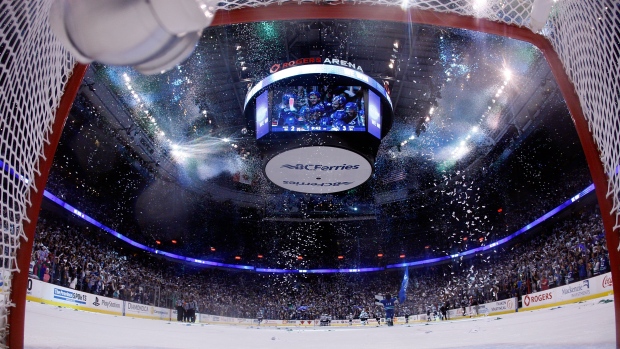Apr 9, 2015
Legal battle opens window into how NHL teams construct corporate deals
A B.C. judge has reduced the amount of money Canon Canada will be forced to pay to the Vancouver Canucks after their multimillion-dollar sponsorship agreement fell apart. As TSN Senior Correspondent Rick Westhead writes, the legal battle between a Fortune 500 company and one of the most valuable NHL franchises has opened a window into how NHL teams construct their corporate partnerships

A B.C. judge has reduced the amount of money Canon Canada will be forced to pay to the Vancouver Canucks after their multimillion-dollar sponsorship agreement fell apart.
The legal battle between a Fortune 500 company and one of the most valuable NHL franchises has opened a window into how NHL teams construct their corporate partnerships, and details the value a large-market team places on everything from in-arena signage to the use of their home rink for a corporate skate.
In its lawsuit, filed in 2009 in B.C. Supreme Court, the Canucks alleged that Canon backed out of a five-year, $1.7 million sponsorship arrangement that would have also seen the team buy office equipment from Canon for a 52 per cent discount. As part of the agreement, Canon would also receive other advertising and sponsorship benefits.
A judge ruled in 2013 that Canon had indeed breached its contract and that it owed the team $826,987 for backing out of the pact. The judge determined that amount after the team later reached a deal that was worth $905,000 with Xerox.
Canon appealed the decision, alleging that the judge has mistakenly interpreted emails between the companies as a concrete business deal. A B.C. appeals court has now lowered the amount Canon must pay the Canucks to $763,888.
The appeals court judgment details the email exchanges between Canucks and Canon executives during the fall of 2008.
On Dec. 2, 2008, Canon's legal department emailed copies of the tentative sponsorship agreement to the Canucks with revisions. The company wanted modifications to the NHL work disruption clause and another clause that required the removal of its sponsor benefits during the 2010 Winter Olympics.
Nine days later, a Canon executive advised his colleagues working on the Canucks account that Canon was at an impasse and was pulling out of the sponsorship agreement. He directed them to cease communications with the Canucks.
The newly published decision also highlights how the value of sponsorships is often inflated. Typically, as was the case with the prospective Canucks deal with Canon, contracts include "trade" or "contra," which amounts to discounts on equipment.
The Xerox agreement, for instance, only included $250,000 that was payable to the Canucks in cash over four years.
The latest court decision revealed that the team sells advertising in the Rogers Arena on the so-called "power ring" for $20,000 per minute and on the "score clock halos" for $15,000 per minute. The team sold both as a package for a bulk price of $25,000 per minute, court documents show.
The comments also show the Canucks value a 200-level luxury suite at $5,000 per use and a corporate skate at $3,400 per use.

